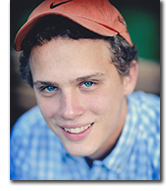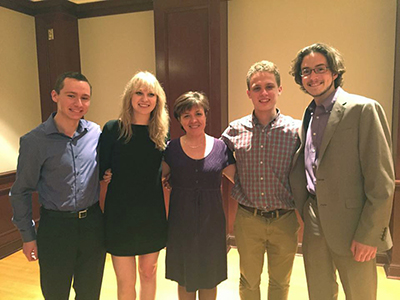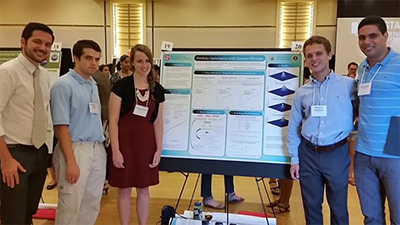Ben Neuhaus (Class of 2017)

- junior double major in Mathematics and Quantitative Economics
- from Kirkwood, MO
- member of Alpha Phi Omega (a service fraternity), Running Club, Big Brothers/Big Sisters, and Cru (a Christian organization)
- participated in an undergraduate research program at North Carolina State University in the summer of 2015
- College of Arts and Science Ambassador
"Practicality in your chosen major is definitely something to consider, but don't let that consideration lead you to push your passions to the side. Do what truly intrigues and excites you, and excel at it."
Why Miami?
"I wanted to find a school in the Midwest that was academically strong and had a vast array of majors and extracurriculars to choose from. Miami fit really well, and during my second visit, it started to feel like a place I could call home.

Dr. Olga Brezhneva (center), Ben Neuhaus (second from right), and other students pose at the Math Awards Banquet.
"I enjoyed and excelled at math from an early age, so I picked math as my first major. I appreciate how it is, in a sense, straightforward, but the way to get to the answer is not usually straightforward. That's why I particularly enjoy the higher level classes which are more abstract and incorporate creativity.
"I wanted to pair my math major with another major that relies heavily upon math. I was originally going to double major in finance, but then I took an economics class with Dr. Charles Moul. He made it very interesting and applicable, so I decided to make Quantitative Economics my second major instead.
"I also like Miami's attention to undergraduate teaching. I've been surprised by the number of professors I've met who truly care about their students' wellbeing and not just their own research. I met one of my most influential professors, Dr. Olga Brezhneva, during my orientation. Since then, I've taken a class with her nearly every semester, and she has greatly encouraged me in my pursuits."
Best Miami Experiences
"I enjoyed taking microeconomics with Dr. Moul. His class didn't seem like just a presentation of facts; it taught me to look at the world and recognize the causes and effects of economics in everyday occurrences.
"For example, there was the concept that senior and child discounts don't exist because businesses are nice, but rather because they are trying to price discriminate between the different age groups to maximize profits. Ideas such as this really struck me and showed me how most behaviors have some identifiable root. It was interesting to see how there are logical explanations for most behaviors or trends.
"My optimization class last spring with Dr. Olga Brezhneva was another great experience, because it was the first time I found a specific area of math that really aligned with my talents and interests. I have always had a puzzle-driven mind, and optimization is essentially about solving puzzles. It's fascinating to see the methods that have been developed to solve difficult problems and how those methods were derived."
Undergraduate Research Experience at North Carolina State

Ben Neuhaus (second from right) and other REU (Research Experience for Undergraduates) students stand beside their presentation at a poster session.
"Since I first arrived at Miami, I really wanted to do research. Although I enjoy learning in the classroom, doing research provides me with an opportunity to apply what I've learned in a new context. I had such an opportunity last summer when I participated in a 10-week undergraduate research project at North Carolina State. I was in the financial mathematics group, and we met with a graduate advisor and professor daily to make sure we were on the right track.
"My group consisted of 4 undergraduate students from different schools. Our objective was to take an existing mathematical model, the Black-Litterman model, and use our collective knowledge to improve upon it. It was quite frustrating at times, but the experience taught me to push through those frustrations and look at the bigger picture. I think that we all got something out of the project, and we were able to produce some rather significant results.
"The professor who oversaw our research essentially told us, 'Read these papers, then take this model and see what you can do with it.' Since it was a group project, the experience taught me how to effectively work and communicate with others. I learned how to recognize people's individual strengths and then distribute various tasks based on those strengths."
Miami and Liberal Arts Education
"I believe that a liberal arts education encourages creativity and innovation, which is extremely beneficial. When you're given a problem to solve in the real world, there's rarely a single, clear-cut solution. Instead, you have to be creative and consider a variety of methods, then decide which is most effective.
"A liberal arts education turns you into a more effective problem-solver. I feel that the goal of the professors isn't just to teach us the material, but to teach us how to think about and solve problems."
Advice to Students
"Practicality in your chosen major is definitely something to consider, but don't let that consideration lead you to push your passions to the side. Do what truly intrigues and excites you, and excel at it.
"I always knew I liked math, but I initially tried to push that passion aside in order to do something more practical like business. I think we all have God-given passions and talents, and we tend to squander them by only doing what seems practical. In the long run, it's much more important to do something that is meaningful to you. If you are patient and work hard, you will most likely arrive at an opportunity which suits your interests.
"It's also very important to get involved in some outside activities. I have been involved in several organizations that have significantly impacted me, including a service fraternity, Alpha Phi Omega. The advisor has become a good friend of mine, and it's been amazing to see how impactful service is for all those involved. I've also been very involved with Cru, a Christian organization on campus. I believe my relationship with Christ is what really provided me with the confidence and encouragement I needed to get through all the challenges school presented. It also helped to focus my endeavors when I was lacking vision. I would really encourage others to see things such as service and faith not as hindrances to their education, but as enhancements."
[September 2015]

